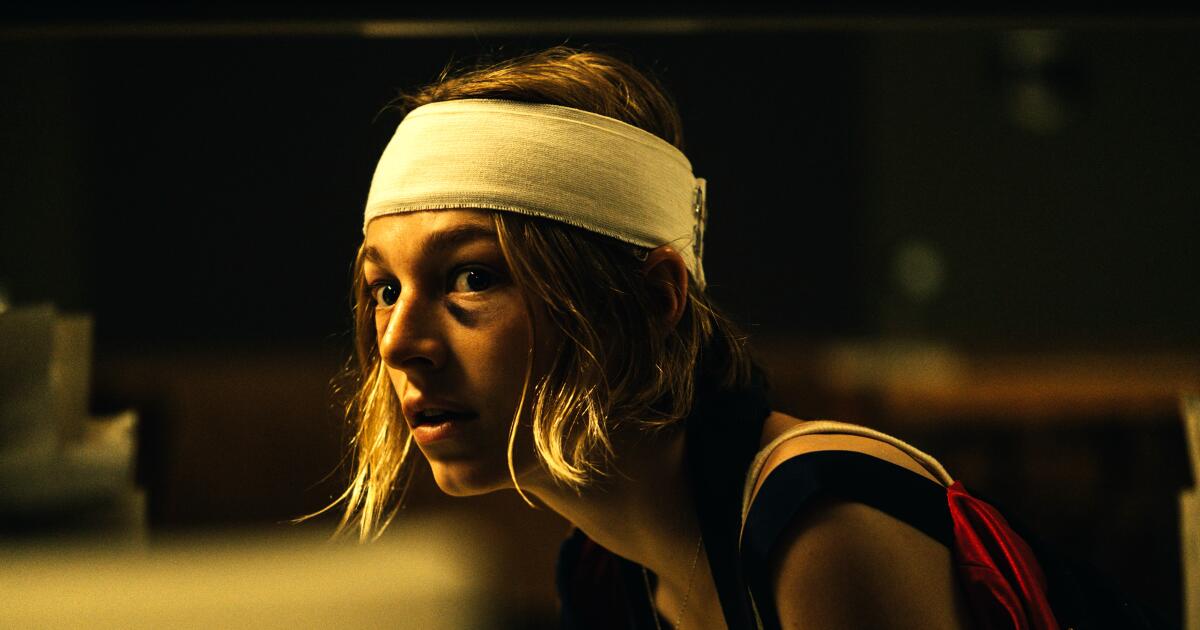Many of the needle drops scattered throughout Tilman Singer’s horror film “Cuckoo,” which opened Friday, were written in the first draft of a 2019 script.
But the film’s musical touchstone, a soft rock number sung onscreen by “Euphoria” star Hunter Schafer, wasn’t completed until years later.
Shafer stars as Gretchen in Singer’s sophomore feature, a quirky teenage girl who leaves the United States after her mother dies and lives with her father Louis (Marton Csokas), stepmother Beth (Jessica Henwick), and eight-year-old stepsister Alma (Milla Liu) at a resort in the German Alps. After taking a job as a receptionist at a nearby lodge, Gretchen has increasingly bizarre encounters with the resort’s guests and quirky owner Herr Koenig (Dan Stevens), which suggest that her picturesque new home is not the paradise it claims to be.
On the psychedelic horror journey “Cuckoo,” the music serves as an emotional and narrative guide, telling “another story” than the surface-level plot, Singer said.
Fittingly, the film’s first truly terrifying scene takes place in a scene where Gretchen is playing the bass in her room. Wearing noise-cancelling headphones, she sings and strums along to a grunge track as Alma watches from the sidelines.
A long scene builds tension by alternating between sonic perspectives until Gretchen sees her sister suffer a series of seizures, which we later learn are a response to the sinister siren song of the cuckoo people who inhabit the resort of Alpschatten, or what Singer calls the “Homo cuculidae.”
Singer’s script was spot-on with this scene, evoking the sisters’ estrangement and forming their central conflict. But not everything went as planned.
Originally, Singer envisioned Gretchen performing songs by the alternative rock band Jesus and Mary Chain. The band’s style suited her perfectly. “They’re very loud, but they have this, shoegaze, nonchalant attitude.” But when Neon decided the licensing fees were too expensive, he rethought the idea.
“I looked back at my list, and it had stuff like Suicide and Velvet Underground on it. I was like, ‘Okay, I’m not buying any of that,'” Singer said. That’s when he called Simon Wasco.
Wasko, Singer’s high school friend and longtime creative partner, previously scored the director’s feature debut “Luz” (2018) and several short films they collaborated on in the early to mid-2010s. He wrote “Gretchen’s Song” in a single afternoon.
“It just worked very quickly,” said the Cologne-based composer. “Of all the music I’ve written for films, that song was the easiest.”
Following Singer’s impromptu suggestion, Wasco adapted the bass-heavy track, featuring a “spaghetti western melody” from their old short film “Dear Mr. Vandekurt” and a beat from the Jesus and Mary Chain.
Shafer was so taken with the song that after Waskow recorded her vocals, he re-recorded them to match her vocals.
“Hunter’s performance was really sweet and charming, and it wasn’t very forced, and it basically just clicked,” he said. Shafer learned bass for the film, but in the scene, she sounds like she’s been playing for years.
“What I really love about her is that she can be very delicate, emotional, and (really) deep in a way that’s kind of comfortable but not casual,” the singer said.
A portion of “Gretchen’s Song” became the theme of the teenage protagonist, and it is repeated throughout “Cuckoo,” most notably in the reconciliation scene between Gretchen and Alma at the film’s conclusion.
Singer described Gretchen’s performance as “a melancholy melody that transforms into something hopeful” and “reflects the film’s overall intent.”
Other songs on the “Cuckoo” soundtrack also reflect the scene: Gerhard Trede’s jazzy blues sets the old-world atmosphere of the resort lobby, while Martin Dupont’s French New Wave expresses the romantic tension between Gretchen and the charming resort guests.
In “Kuku,” the singer says music is a strategy for building a world, just like costumes or stage design.
But more importantly, music is Gretchen’s “philosophy” in mourning her mother, and her most reliable “weapon” against the cuckoo people, whose shrill cries contrast sharply with Gretchen’s low-pitched theme.
“It’s a super classic hero’s journey,” Wasko said. “Gretchen faces danger and then becomes like a musician.”
“I always felt like she had to defend herself with music,” the singer said.
